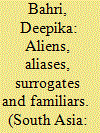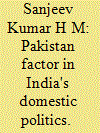| Srl | Item |
| 1 |
ID:
120703


|
|
|
|
|
| Publication |
2013.
|
| Summary/Abstract |
In this essay, I argue that alienation and familiarity serve as mobile matrices for understanding the affectively experienced impact of transnational migration in certain of Jhumpa Lahiri's short stories. While we may think of alienation as a precondition of migrant identity, it is a condition that is familiar to most of us in different contexts. How does alienation, thus plurally conceived, figure in the experience of migrants, producing the relay between heimlich/unheimlich experiences? Moreover, in the socio-cultural context of globalisation, how does transnational migration challenge conventional notions of family, a word associated with notions of familiarity and filiation that are seemingly antonymous to the idea of alienation? These are the questions I set out to answer, concluding that the 'family' is always a unit composed by its very hauntings, surrogates, and absences.
|
|
|
|
|
|
|
|
|
|
|
|
|
|
|
|
| 2 |
ID:
117904


|
|
|
|
|
| Publication |
2011.
|
| Summary/Abstract |
Overt acquisition of nuclear weapons capacity by India and Pakistan in May 1998 signalled a tectonic shift in the nature of subcontinental conflicts. India's military superiority in the region and its strategic depth got considerably weakened due to Pakistan's attainment of strategic parity vis-à-vis India. In the wake of overt nuclearisation, the logic of nuclear deterrence in subcontinental security dynamics was also questioned because of continued security instability, evident in instances like the military impasse of 2001-2002. Hence, the subject of nuclearisation of subcontinental security began to capture wider spaces in the political debates in India. This strategic decision, having been taken by a coalition government, imparted enormous complexities to the domestic political exchanges over the security dynamics of the subcontinent. It also drastically transformed the nature and content of India's domestic politics, as it brought strategic issues and foreign policy agenda of the government into the political parlance of the common people.
|
|
|
|
|
|
|
|
|
|
|
|
|
|
|
|